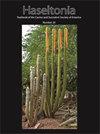许多仙人掌在其皮质束上有一簇末端管胞
IF 0.4
4区 生物学
Q2 PLANT SCIENCES
引用次数: 2
摘要
摘要/ Abstract摘要:仙人掌亚科的大多数仙人掌都有一个由皮层束网络构成的厚皮层。注意到一些皮质束具有叶状特征:末端管胞簇。本研究的目的是检查一系列的物种和特征集群。在85属226种中,105种(46.7%)有顶生管胞簇。带簇的种广泛分布于整个亚科。少数属是均匀的,所有的采样种都有集群(Ariocarpus, Corryocactus)或所有的采样种都没有集群(Armatocereus, Mammillaria, Melocactus)。大多数属为变异属(如蜡属、闭锁属),有的种有末端管胞簇,有的种没有。在存在的地方,花束由短的,宽的管胞(不是导管分子),一个或几个韧皮部杆组成,但没有纤维或硬核(除了Strombocactus盘状)。集群最可能发生在肋骨或结节的顶端,特别是在一个环孔附近;它们也经常出现在肋骨的表面;在肋骨之间的鼻窦处最不常见。它们无一例外地发生在栅栏皮层内或沿其底部,但从不发生在皮层深处。没有明显的生态或功能作用。本文章由计算机程序翻译,如有差异,请以英文原文为准。
Many Cacti Have Clusters of Terminal Tracheids on Their Cortical Bundles
Abstract: Most cacti in subfamily Cactoideae have a thick cortex vascularized by a network of cortical bundles. It was noticed that some cortical bundles had a leaf-like feature: clusters of terminal tracheids. The objective of this research was to examine a range of species and characterize the clusters. Of the 226 species examined in 85 genera, 105 (46.7%) had clusters of terminal tracheids. Species with clusters were widely distributed throughout the subfamily. A few genera were uniform, with all sampled species having clusters (Ariocarpus, Corryocactus) or with all sampled species lacking them (Armatocereus, Mammillaria, Melocactus). Most genera were variable (e. g., Cereus, Cleistocactus) having some species with terminal tracheid clusters and other species lacking them. Where present, the clusters consisted of short, broad tracheids (not vessel elements), one or several phloem poles, but never fibers or sclereids (except Strombocactus disciformis). Clusters were most likely to occur at the apex of a rib or tubercle, especially near an areole; they often also occurred along the face of a rib; they were least common at the sinuses between ribs. Without exception, they occurred within the palisade cortex or along its base but never deep within the cortex. No ecological or functional role was obvious.
求助全文
通过发布文献求助,成功后即可免费获取论文全文。
去求助
来源期刊

Haseltonia
生物-植物科学
CiteScore
3.00
自引率
6.70%
发文量
11
审稿时长
>12 weeks
期刊介绍:
Haseltonia, Yearbook of the Cactus and Succulent Society of America, is published in full color and features peer-reviewed articles about all aspects of cacti, succulents and their environs. Topics include current research and conservation reports, new species descriptions and lengthy taxonomic revisions, historical and biographical notes, chemical and cytological studies, evolutionary biology and ethnobotanical reports, propagation and pest control methods, and pollinator studies. Serious students of the world''s succulent flora, botanists, taxonomists, researchers and horticulturalists will all find Haseltonia a valuable addition to their book collection.
 求助内容:
求助内容: 应助结果提醒方式:
应助结果提醒方式:


